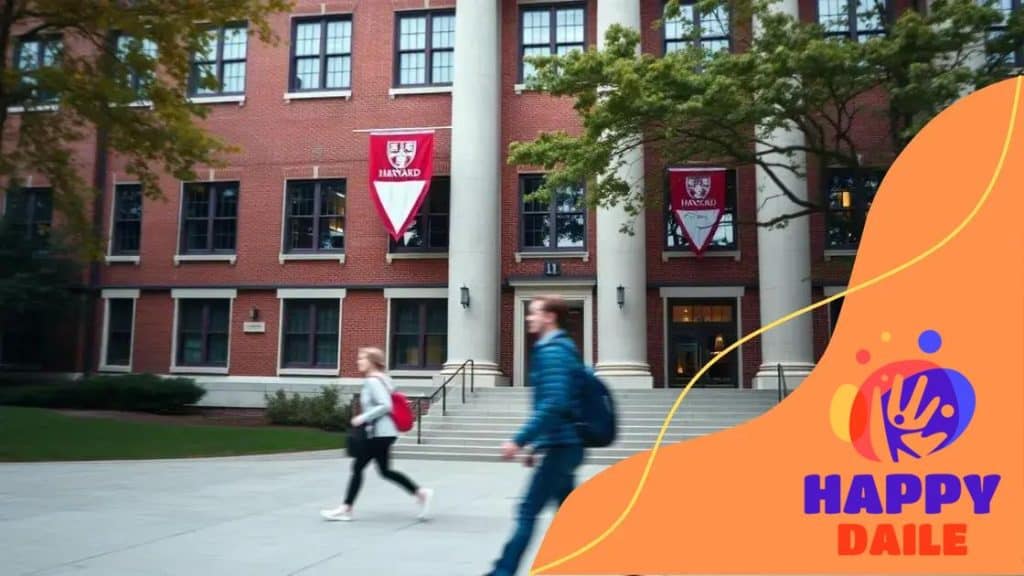Harvard Certification revoked: What it really means and why it matters

Anúncios
Harvard Certification revoked; those words can spark a knot in the stomach of ambitious students and professionals alike. This article peels back the layers of meaning behind such a dramatic turn, shining a light on the processes, risks, and possible paths forward when a prestigious credential is pulled.
Whether you’re scrambling to hold onto your hard-earned badge or seeking to understand the implications, this guide walks you through the full story of what happens when Harvard Certification revoked comes into play, and how you can rise from the ashes.
Anúncios
Understanding the Harvard Certification process
The risk of having a Harvard Certification revoked begins long before the credential is granted. The process itself is built to uphold strict academic and ethical standards through detailed evaluation.
Applicants submit academic records, work history, and references. These documents are closely reviewed by faculty to ensure authenticity and compliance with institutional expectations. Errors or vague information may delay approval, or raise concerns later. In some cases, these oversights become the reason for a certification to be revoked after issuance.
Many assume that simply holding a degree guarantees success. However, Harvard requires proof of integrity, relevance, and active engagement with professional development.
Understanding the full process helps applicants avoid critical mistakes. Clarity and honesty from the start are essential to maintaining a valid credential and avoiding complications down the line.
Anúncios
What is the Harvard Certification process?
Harvard Certification revoked decisions don’t occur without due process. Each certification is granted through a layered and rigorous system that evaluates academic, professional, and ethical criteria. Every applicant must go through this system before being awarded a credential.
This process begins with a detailed application, which includes personal information, academic records, and evidence of experience. Submissions are reviewed by committees to ensure transparency and authenticity. Only candidates meeting strict standards are considered for approval.
Errors or discrepancies in this phase can raise red flags. If issues go unnoticed at first but are discovered later, a certification might be challenged and potentially revoked. Understanding each phase is crucial to protect your status.
The steps involved
Applicants start by submitting all required forms and documentation. The materials are first checked for completeness, then carefully analyzed by faculty or verification teams. Each stage filters out errors, omissions, or fraudulent claims before moving forward.
Once the initial review is completed, a more thorough evaluation considers the depth of academic achievement and relevance of experience. This step reinforces the institution’s credibility and protects the certification’s integrity.
Finally, applicants are informed of acceptance or additional requirements. Any deviation from these expectations can eventually lead to having a Harvard Certification revoked if overlooked. That’s why clarity, honesty, and attention to detail are essential.
Importance of supporting documentation
Proper documentation is the backbone of certification. Submitting incomplete or invalid files is one of the leading causes behind a Harvard Certification revoked case. Each form submitted needs to accurately support your claims.
Documents should be timely and directly connected to the field of study. Fabricated or outdated materials can jeopardize the entire process, regardless of your qualifications. Consistency and accuracy play a decisive role during evaluations.
Being meticulous with your application builds trust. Strong supporting evidence not only increases approval chances but also helps defend your status if questions arise later. It’s a foundation that safeguards your hard-earned credentials.
Reasons for the revocation of certifications
A Harvard Certification revoked case usually stems from a few core issues. The most common is providing false or misleading information during the application process.
Whether it’s fake credentials or overstated experience, dishonesty leads to serious consequences. Harvard must act to protect the credibility of its certifications.
Policy violations are another frequent cause. Plagiarism, cheating, or misconduct during program activities are clear breaches that can trigger revocation. Failing to meet ongoing requirements, like not completing updates or ignoring fee obligations, can also lead to removal of certification status.
While some infractions are deliberate, others result from misunderstanding or oversight. Still, all are taken seriously. Knowing these risks helps applicants and professionals avoid the path that ends in revocation.
Common reasons for revocation
When a Harvard Certification revoked notice arrives, it often points to serious causes. One of the most common is fraudulent claims. Individuals who provide false information about their academic background or work experience put the certification’s integrity at risk. This damages trust in the credential, impacting not only the person involved but also Harvard’s reputation.
Policy violations are another major reason behind revocation. These can include academic dishonesty such as cheating or plagiarism. Misconduct in behavior, especially while representing Harvard, also leads to severe consequences. Additionally, failing to maintain required standards, like ongoing education commitments, may result in certification loss.
Another overlooked cause is the failure to meet financial obligations. Not paying necessary fees on time can trigger revocation, as institutions enforce strict policies to protect program quality. Professionals must regularly review all Harvard rules to avoid accidental violations. Staying informed is critical to keeping the certification valid and respected.

Implications for affected individuals
The effects of a Harvard Certification revoked status extend far beyond a simple document. Losing certification can deeply impact an individual’s career and self-identity. Suddenly, doors to many job opportunities may close, especially in fields that strictly require this credential.
Without a valid certification, professionals often face longer job searches. They might even be deemed unqualified for positions they once held. This situation creates financial pressure and affects personal confidence. The struggle to rebuild a career can be emotionally draining and complicated.
Trust is also compromised. Employers and colleagues may question the individual’s integrity after revocation. Regaining credibility demands transparent communication about what happened. Demonstrating commitment to ethical standards and engaging in professional communities can gradually restore respect and open new doors.
Financially, the consequences are significant. Retraining and pursuing new certifications take time and money. Job search costs add up, and income loss during this period creates additional stress. Despite these challenges, with planning and perseverance, recovery is achievable. Understanding the impact prepares affected individuals to face the road ahead more confidently.
How to appeal a certification revocation
Facing a Harvard Certification revoked decision can be daunting, but appealing provides a second chance. The first step is to carefully review the revocation notice to understand the exact reasons. This helps frame a focused and effective response.
Next, gather all supporting documents that prove your case. These may include diplomas, transcripts, or letters from supervisors confirming your qualifications. Providing evidence of compliance with policies strengthens your position significantly.
Writing a clear, professional appeal letter is crucial. Address each reason for revocation logically and respectfully. Avoid unnecessary details and keep the tone formal but concise. Submitting your appeal before the deadline ensures it is reviewed properly.
Following up with the certifying body can be beneficial. Confirming receipt and asking about timelines shows your commitment. Although the appeal process is challenging, a well-prepared case increases the chances of reversing the decision and restoring your certification.
Steps to take following revocation
After a Harvard Certification revoked notice, it’s vital to take thoughtful actions. Begin by understanding fully why the revocation occurred. Analyzing the reasons helps you avoid repeating mistakes and plan your next moves carefully.
Seeking advice from a legal or academic professional is highly recommended. Experts can clarify your rights and guide whether to pursue an appeal or alternative routes. Knowing all your options helps you make informed decisions.
Prepare your appeal thoroughly if you choose to contest the revocation. Organize all relevant documents, including proof of qualifications and references. Maintain open communication with the certifying body and express your willingness to resolve the issue professionally.
While managing the appeal, consider advancing your education. Enrolling in courses or training can show dedication to improving your skills. Updating your resume and online profiles also helps highlight your strengths despite the setback. These combined efforts improve your chances of moving forward positively.
Future of certifications at Harvard
The future of Harvard certifications will continue to evolve amid shifting educational and professional landscapes. Cases of Harvard Certification revoked influence stronger emphasis on transparency and accountability.
Certification programs are increasingly aligned with real-world skills employers demand. This ensures graduates gain relevant knowledge and are workforce-ready. Harvard is also embracing technology more, expanding online and hybrid learning to reach broader audiences.
Micro-credentials and shorter, specialized certifications are gaining popularity. They provide flexibility and meet niche industry needs without committing to lengthy degree programs. This modular approach supports lifelong learning and continuous skill updates.
Global partnerships are another key trend. Harvard is expanding collaboration with international institutions, creating credentials recognized worldwide. This fosters diverse learning experiences and greater credential value across borders.
Together, these developments point to a future where Harvard certifications remain prestigious, adaptive, and highly relevant in a fast-changing world.
FAQ – Frequently Asked Questions about Harvard Certifications
What are the main reasons for certification revocation at Harvard?
Common reasons include fraudulent claims, violations of policies, and failure to meet ongoing education requirements.
How can I appeal a certification revocation?
To appeal, review the revocation notice, gather supporting documentation, and draft a clear appeal letter to the certifying body.
What should I do immediately after my certification is revoked?
Assess the situation, seek legal advice if necessary, and prepare for the appeal process by gathering all relevant evidence.
What is the future of certifications at Harvard?
The future likely includes adapting to industry needs, increased use of technology, emphasis on lifelong learning, and expanding global collaborations.





